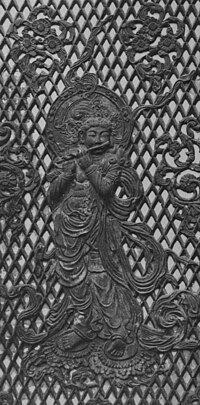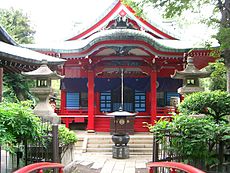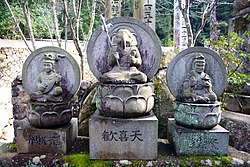|
Hinduism in Japan
Hinduism is a minority religion in Japan mainly followed by the Indian, Sri Lankan and Nepali expatriate residents of Japan, who number about 166,550 people as of 2022. It's also widely integrated into the native Shinto-Buddhist religion which has had a significant impact on Japanese culture; Buddhism being an Indian religion is largely related to Hinduism, and most of its cultural practices are similar to those found in Hinduism.[1] History
 Hinduism diffused throughout East Asia via trade routes, and also through the expansion of Buddhism in the sixth century. [2] There has also been significant transfer of Hindu-derived material native to China and South East Asia into Japan over the past two millennia.[3][4][5] Diffusion of Hinduism in Japan
Hindu deities have been integrated into Japanese religious culture and several deities are worshiped for good luck.[6] In fact there are many deities that are still worshiped in Japan which have long been forgotten in India.[7] Saraswati (Benzaiten) is arguably the most revered deity in Japan after the Buddha.[8] She forms as a part of the "Seven Gods of Fortune", of which four originated as Hindu deities: Benzaitensama (Sarasvati), Bishamon (Vaiśravaṇa or Kubera), Daikokuten (Mahākāla or Shiva), and Kichijōten (Lakshmi). The last, along with Benzaitennyo (Saraswati) and the female version of Daikokuten completes the nipponized Tridevi of Great Goddesses.[9]  The Hindu god of death, Yama, is known in his Buddhist form as Enma. Garuda, the mount (vahana) of Vishnu, is known as the Karura (迦楼羅), an enormous, fire-breathing creature in Japan. It has the body of a human and the face or beak of an eagle. Tennin originated from the apsaras.[citation needed] Ganesha (or Kangiten) is prayed to for health, success and good fortune. Many Japanese Buddhist deities (or Tenbu) have their roots in Hinduism and are still revered by many Japanese particularly in Shingon Buddhism.[citation needed] Other examples of Hindu influence on Japan include the belief of "six schools" or "six doctrines" as well as use of yoga and pagodas.[citation needed] People have written books on the worship of Hindu gods in Japan.[10] Even today, it is claimed Japan encourages a deeper study of Hindu Gods.[11] List of Hindu gods in Japanese culture
Present situationHinduism is practiced mainly by the Nepali, Indian and Sri Lankan migrants, although there are others. As of 2022, there are 40,917 Sri Lankans, 40,752 Indians and 125,798 Nepalis in Japan.[13][14] The few Hindu temples in Japan are as follows:
The Association of Religion Data Archives estimated that 24,182 Hindus in Japan as of 2020.[15] References
Notes
External links |
|||||||||||||||||||||||||||||||||||||||||||||||||||||||||||||||||||||||||||||||||||||||||||||||||||||||||||||||||||||||||


